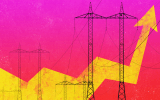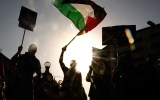
Australia will recognise a Palestine state, Prime Minister Anthony Albanese has announced.
“A two-state solution is humanity’s best hope to break the cycle of violence in the Middle East and to bring an end to the conflict, suffering and starvation in Gaza,” Albanese said.
“The international community’s vision for a just and lasting peace in the Middle East always encompassed two states – living side-by-side with internationally recognised borders. A state of Israel and a state of Palestine with security for the people of both nations.”
He said Monday’s announcement alongside Foreign Minister Penny
Wong came after he had spoken to the leaders of Britain, France, Japan and New Zealand. Albanese also raised the issue with Israeli Prime Minister Benjamin Netanyahu and Palestinian President Mahmoud Abbas last week.
“I have said it publicly and I said it directly to Prime Minister Netanyahu – the situation in Gaza has gone beyond the world’s worst fears. Far too many innocent lives have been lost,” he said.
“The Israeli government continues to defy international law and deny sufficient aid, food and water to desperate people, including children. This vital aid must be allowed to get to the people who need it most. This is about much more than drawing a line on a map. This is about delivering a lifeline to the people of Gaza.”
Australia will make its recognition formal at September’s meeting or the United Nations General Assembly in New York.
Earlier, amid speculation the Australian announcement was imminent, Netanyahu singled out Australia and other European countries as “shameful”.
He warned recognition of Palestine would not bring about peace in the Middle East.
“To have European countries and Australia march into that rabbit hole … this canard, is disappointing and I think it’s actually shameful,” he said.
“[Australia] know what they would do if right next to Melbourne or right next to Sydney you had these horrific attacks.”
France, Britain and Canada also plan to recognise Palestine at the UN gathering, as long as certain conditions, including that Hamas has no role in any government and the return of Israeli hospitals, are met. New Zealand said on Monday it was mulling its position on Palestine.
More than 140 of 193 UN member states already recognise Palestine, including European Union member states Spain and Ireland.
While Labor has long supported a two-state solution where Israel and Palestine peacefully co-exist, the federal government has been hesitant to commit to a timeline on recognition. Albanese has previously said recognition was a matter of “when, not if”.
As images of emaciated children have poured out of the Gaza Strip, the federal government has faced increasing pressure to do more.
At least 90,000 protesters marched across the Sydney Harbour Bridge last week, alongside thousands more in other Australian capitals, urging the government to sanction Israel.

Momentum for a Palestinian state has also swelled within Labor’s ranks, as MP Ed Husic and former foreign minister Bob Carr called for action.
The crisis in Gaza began after Hamas attacked Israel on October 7, 2023, killing 1200 people and taking about 250 more hostage.
Israel’s response has since killed more than 61,000 people, according to Gaza’s health authorities, and UN sources project more than two million people are facing high levels of acute food insecurity.
Israel denies the population is suffering or dying from starvation, despite international human rights groups condemning its offensive.
Liberal senator and former ambassador to Israel Dave Sharma said recognising Palestine would make a ceasefire in the region even more difficult
“It’s made Hamas less likely to reach a ceasefire,” he told ABC radio.
“It’s made Hamas be able to portray itself as making political progress because of its military action
“That is actually pushing back the resolution of this conflict, which I think has been a deeply unfortunate consequence.”
-with AAP










